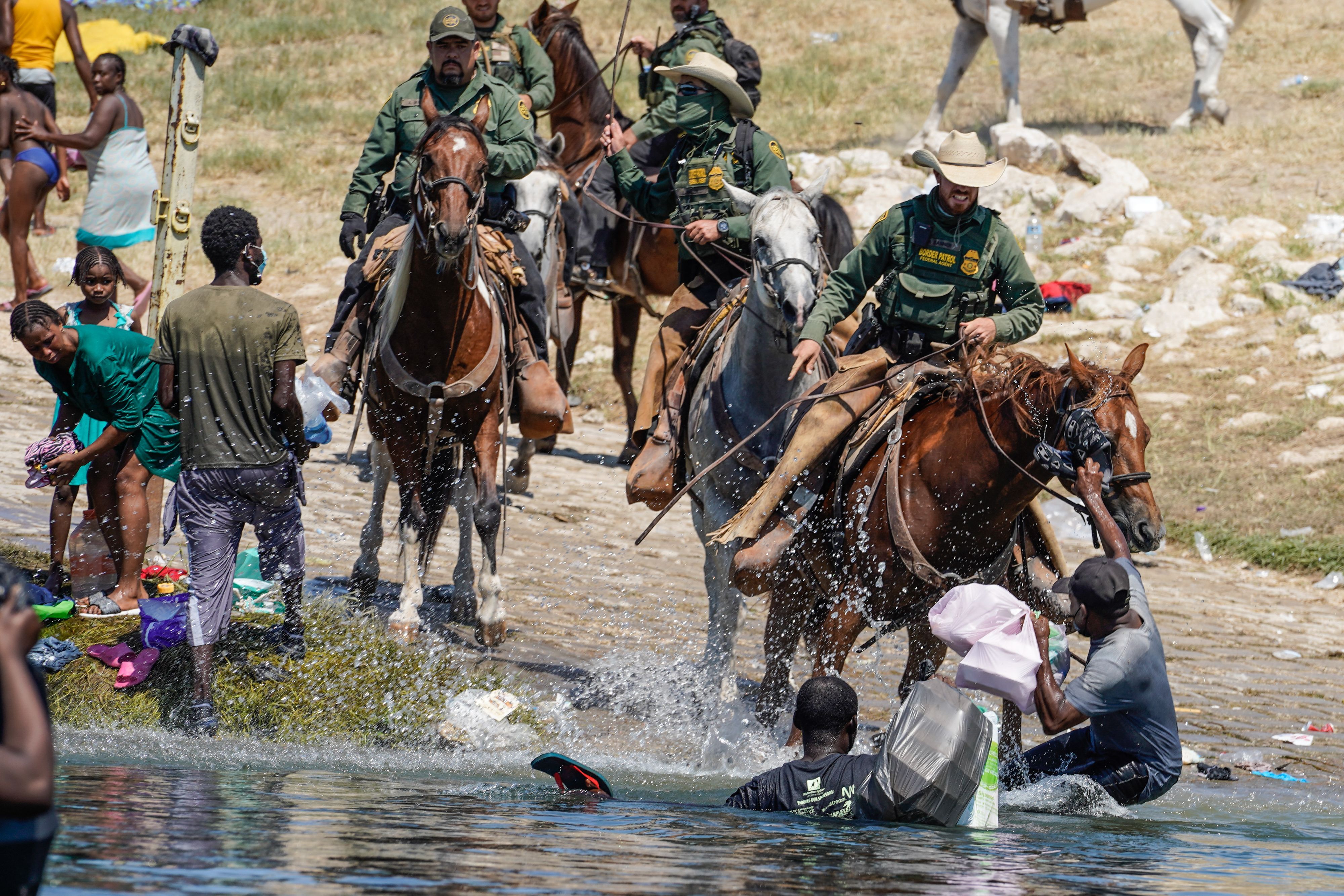US Border Agents Are Removing Haitian Migrants Using Horses and Whips
Border Patrol officers on horseback swinging whips in the faces of Haitians. Families with toddlers scrambling across the Rio Grande back into Mexico to avoid being deported. Haitian parents crying as they faced the prospect of being deported home to a social and political crisis that seems to see no end.
Those were among the scenes in the town of Del Rio, Texas, over the weekend as the U.S. government took a hard-line stance against thousands of newly-arrived Haitian migrants seeking protection. The situation is becoming a public relations and humanitarian challenge for U.S. President Joe Biden’s administration, as images of Border Patrol agents on horseback screaming at and chasing desperate Haitians reverberated across the internet.
“This is why your country’s shit, because you use your women for this,” one officer on horseback shouted at a group of Haitian women who were crossing the Rio Grande with bags of food, showed one report by Al Jazeera.
The situation along the southwest Texas border at the entrance to Del Rio is becoming a bigger problem by the day for President Biden, who is trying to assert control over the international line while fulfilling his promise to take a more humanitarian approach to immigration. He is struggling on both sides, as human rights groups lambasted the treatment of the Haitian migrants and Republicans accused Biden of losing control of U.S. borders.

Even Haiti itself is protesting renewed deportation flights of its citizens, saying it doesn’t have the capacity to take in its own people as it continues to reel from the assassination of its president and a major earthquake in August that killed more than 2,000.
Department of Homeland Security Secretary Alejandro Mayorkas defended the treatment of the Haitians in an interview with CNN, saying there was no contradiction in welcoming Afghan refugees while deporting Haitian refugees. “Those two processes are quite different. We are bringing in Afghan nationals by air after they have been screened and vetted. That is a safe, orderly, and humane process,” he said. “That is quite different than illegal entry in between ports of entry in a time of pandemic when we have been quite clear, explicit, for months now that that is not the way to reach the United States,” he concluded.
“And it will not succeed.”
Last week, a temporary migrant camp underneath an international bridge that connects Mexico to Texas swelled within a matter of days from a couple hundred people to more than 12,000, overwhelming border authorities and fueling xenophobia.
The camp consists mostly of black Haitian migrants, who arrived in the thousands in a matter of days to seek asylum in the U.S. It’s unclear why so many arrived at once. They appear to be a mix of Haitians who have recently arrived in Mexico as well as Haitians who have been waiting in other Mexican border cities for months.
There is no border wall separating the U.S. and Mexico in the area, and Ciudad Acuña, which is across from Del Rio, Texas, has been a safer city for migrants than other nearby Mexican border towns.
Large groups of Africans and Cubans have set up camp in Ciudad Acuña in recent years, but this is the first time in recent history that migrants have camped out on the U.S. side of the border, said Stephanie Leutert, director of the Central America and Mexico Policy Initiative at the University of Texas at Austin.
Part of this has to do with the fact that the water levels at the Rio Grande are low enough for large groups of people to wade across, she said. Also, there is less cartel presence and control than in other border cities like Reynosa and Nuevo Laredo, where migrants can’t cross the Rio Grande without coordinating with the cartels and paying a fee.
U.S. immigration policies also play a role. In years past, migrants tended to stay in Mexican border cities on informal waitlists for their turn to present themselves at a port of entry, but now the U.S. isn’t allowing any migrant to request asylum at ports of entry. Customs and Border Protection didn't immediately respond to a request for comment about agents’s behavior.
“In itself, this isn't new. People have been crossing between ports of entry and asking for protection for years. What is new is the sheer number of people in this one very small town,” said Leutert, who formerly worked in the Biden administration on migration policy. “When there aren’t legal pathways at the border to seek protection, people hold on to whatever tip they hear to try and find a pathway into the United States.”
On Monday, a group of 26 Republican governors published an open letter to President Biden seeking a meeting on illegal border crossings and calling on him to “take action to protect America, restore security, and end the crisis now."
DMT.NEWS
via https://www.DMT.NEWS
Emily Green, Khareem Sudlow

